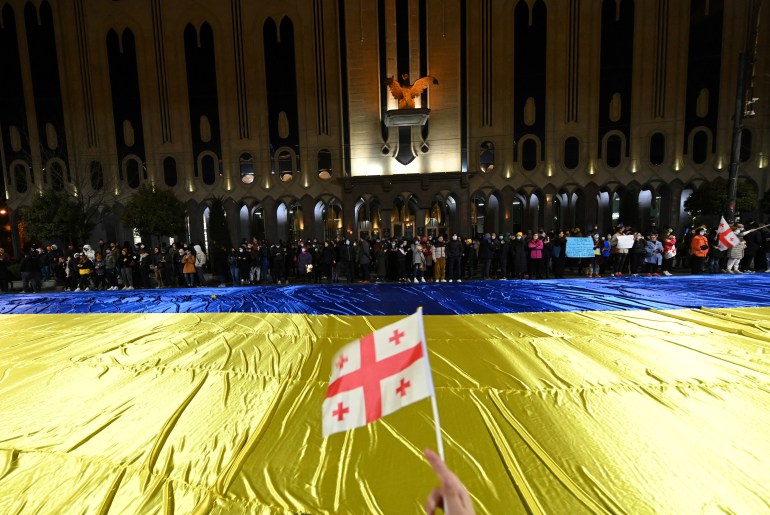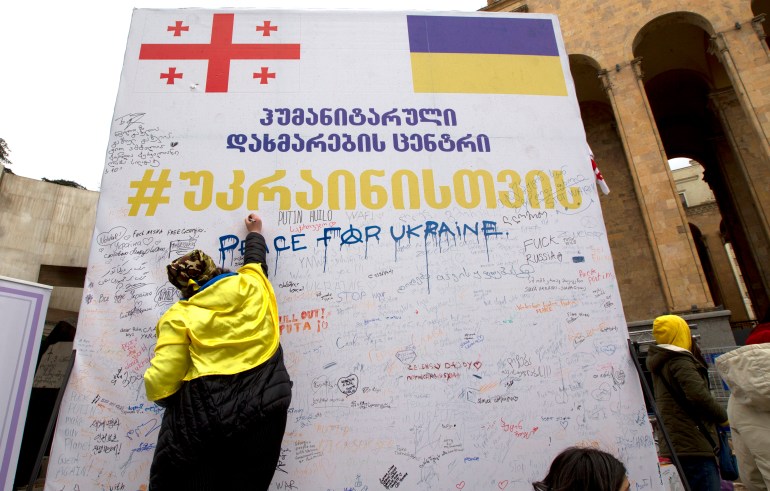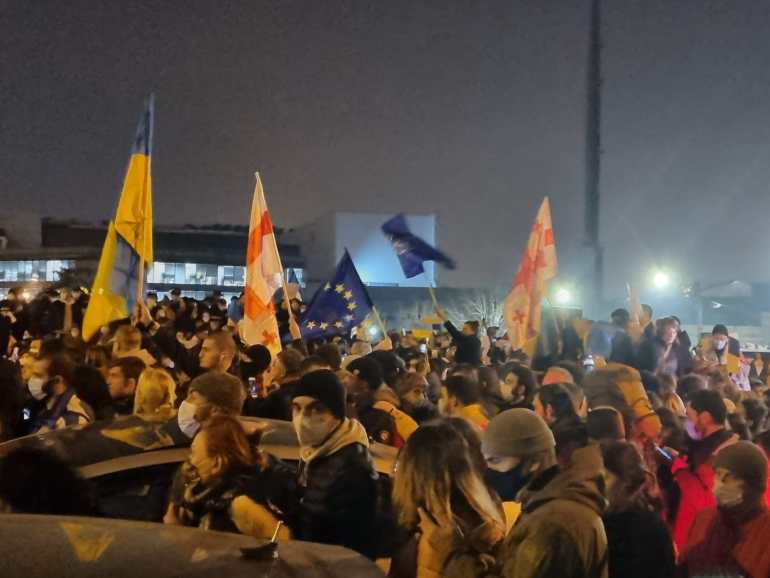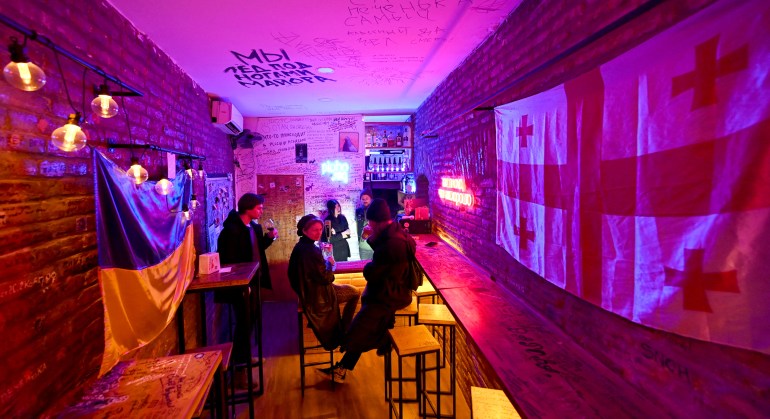‘We are not our government’: Georgians slam Ukraine war response | Russia-Ukraine war
The Russian invasion of Ukraine has sparked political turmoil many miles away in Georgia, with citizens seemingly at odds with their government’s actions.
On February 24, the day the Russian invasion was announced, thousands of Georgians took to the streets of the capital, Tbilisi, to protest it – with some estimates claiming that up to 30,000 joined the march along the city’s Rustaveli Avenue.
While citizens were vocal, the government took a more cautious approach. When many European countries introduced sanctions against Russia, Georgia’s Prime Minister Irakli Garibashvili refused to impose curbs on the country’s northern neighbour, angering the populace.
“I want to state clearly and unambiguously, considering our national interests and interests of the people, Georgia does not plan to participate in the financial and economic sanctions, as this would only damage our country and populace more,” Garibashvili told reporters at a press conference on February 25.
Hours later, thousands again took to the streets of the capital – this time not just in solidarity with Ukraine but in protest at the government’s stance.
“I’m here not only to stand with Ukraine but because of the actions of the Georgian government,” Mindha Gablia, a protester in Tbilisi, told Al Jazeera.
Police lined the streets outside the Government Administration offices as protesters, carrying Ukrainian flags and anti-Putin banners, chanted “Go, go, go!”
A number of banners criticising the Georgian government were on display, some calling for the prime minister to step down and others apologising to the people of Ukraine for the government’s actions.

More than a month into the war in Ukraine, the divide inside Georgia has only grown.
Days after the prime minister’s statement, in a video address from France on February 28, President Salome Zourabichvili expressed Georgian solidarity with Ukraine. During her annual address to parliament on March 14, she criticised both the government and the opposition over their responses to the war in Ukraine and said the government had restricted her international working trips amid the invasion.
The following day, the ruling Georgian Dream party announced its intention to sue the president in the Constitutional Court for allegedly violating the Georgian constitution by travelling to Paris and Brussels to discuss the crisis in Ukraine without first informing the government.
In a statement rebuking the president, Georgian Dream said the government is responsible for the country’s security and foreign policies and stated that the president should only undertake such activities with the government’s consent.
Inside the country, the government is being heavily criticised for its response to the war, with many saying it is not doing enough to stand in solidarity with Ukrainians – and that the consequences of that could, one day soon, be felt in Georgia.
‘Normalisation’ with Russia
Since the first days of the conflict, Tbilisi and other cities across Georgia have seen huge street protests. At a march on February 25, protester Gablia told Al Jazeera that he was “ashamed” of his government’s actions.
“If my Ukrainian brothers and sisters see this then I want them to know that the actions of our prime minister had nothing to do with the Georgian people.”
Gablia, 34, is one of many Georgians who hold bitter memories of 2008 when Russian troops entered Georgia in support of the Russian-backed breakaway states of Abkhazia and South Ossetia. That conflict killed nearly 400 civilians in a 12-day battle between Georgian troops and Russian forces who invaded to back separatist fighters from the two breakaway regions. Tbilisi says more than 200,000 were displaced as a result of the war.
“Their (Russia’s) approach is the same, shelling our buildings while saying that we are shelling them and saying things that are obviously fake before eventually launching an invasion,” Gablia said.
“If they succeed in Ukraine in the long term though, who knows where the next step will be, it could be Georgia or even the Baltic countries.”
When asked if he would be willing to take up arms to defend his country against a Russian invasion he answered: “Absolutely.”

According to a survey by Caucasus Research Resource Centers, two-thirds of Georgians want the government to impose some kind of sanctions against Moscow. And 61 percent of those surveyed said the government should do more to support Ukraine during the crisis.
These figures put much of the population at odds with the position of the ruling Georgian Dream party.
Professor Kornely Kakachia, director of the Georgian Institute of Politics, told Al Jazeera the government is seeking “normalisation” with Russia.
“When Georgian Dream came to power in 2012, they changed the paradigm in Georgian foreign policy. They said that Georgia should not become a playground between the West and Russia. They wanted to continue having good relations with the West but at the same time maintain good relations with Russia,” he said.
“They have been trying to normalise relations with Russia in terms of trade and the economy but not on issues such as the occupied territories. The Georgian government is afraid of the Russian reaction as Georgia could be the next target for Russian aggression – this is why they are very careful.”
Kakachia also spoke about the possibility of the conflict spreading once more onto Georgian soil.
“I think that it is possible that if Russia does not reach its geopolitical aims in Ukraine then Putin will be searching for some sort of small war where he can win and I think that Georgia, perhaps Azerbaijan or even Kazakhstan, could be possible targets,” he added.
‘Georgia will be next’
Many Georgians wonder what a Russian victory in Ukraine might mean for their homeland, and for some, memories of the 2008 invasion mean that this war feels very close to home.
Nodar Rukhadze, co-founder of the pro-opposition Shame Movement, a civil society protest group that was born out of the anti-government protests against the current ruling party in 2019, and which has also organised many of the protests against the Ukraine war, told Al Jazeera about his memories of 2008.
“I was 11 years old when Russians bombed my city, Poti. I know exactly what Ukrainians are feeling right now. I’m scared for every child that is hearing the sound of sirens and the sounds of bombs, they will never forget it. Every time I hear the sound of a helicopter or plane I have this instant fear,” he said.
“There is absolutely no doubt if the Russian aggression in Ukraine is successful then Georgia will be next. I have no doubt.”
Rukhadze, who was arrested at a protest a few days after he spoke to Al Jazeera, was critical of what he sees as his government’s inaction over Ukraine.
“The Georgian government has done nothing in support of Ukraine. They have a policy of not irritating Russia, and they tell us that we must be silent so that we don’t end up with another war with Russia,” he said. “This narrative of course strengthens Russia’s position in Georgia and leaves our country even more vulnerable.
“Georgian people have said very loudly that the current government does not represent the will of the Georgian people,” he added. “Fighting against Russian imperialism and Russian oppression is in our Georgian DNA.”
Many Georgians are waiting to see what their government will do next.

Nineteen-year-old Tbilisi resident and university student Saba Nikadi also said she feels her homeland could be next in the event of a Russian victory in Ukraine.
“This Russian aggression has to stop, and our government is not delivering our message. We want to tell the world that we are not the same as our government,” she said.
“Sanctions for all this may not be the biggest thing for Russia but it sends a message to our Ukrainian brothers that we are standing with them and that we are trying to protect the free world from Russian aggression.
“I feel like if Putin were to succeed in Ukraine, he would absolutely come to Georgia next – but we don’t have time to be worried, we just need to be prepared.”
‘Scare tactics’
While protesters across Georgia have been criticising their government’s actions, they have also been calling on the government to impose sanctions and ban pro-Kremlin media.
Russian state outlet Sputnik has a Georgian service available online and the homegrown right-wing TV channel Alt-Info is also seen by many as toeing a pro-Kremlin line.
Tamar Kintsurashvili, executive director of the Media Development Foundation, told Al Jazeera some outlets stoke fear among the Georgian population, often peddling disinformation and other falsehoods.
“Unlike Ukraine or other post-Soviet countries, direct Kremlin propaganda has limited effect in Georgia among Georgian language media consumers who are more sceptical towards Russian-language media sources like Sputnik or RT,” she said.
“However, indirect pro-Kremlin propaganda conveyed through Georgian language media platforms is more effective since it’s quite difficult for ordinary media consumers [to] directly link it to Russia.”
She said the pro-Kremlin Alt-Info channel, which positions itself as neither pro-Kremlin nor pro-Western, mostly instils fear of war. “The message is that if the country does not immediately sort out relations with the Russian Federation, Georgia will soon share Ukraine’s fate.
“They apply scare tactics,” she added.

Kintsurashvili explained how Alt-Info, which is also blamed for sparking violent protests against a planned gay pride parade in Georgia last year, circulated homophobic fabricated videos falsely suggesting Ukraine is strengthening people’s fighting spirit using videos of gay couples. Other disinformation was shared about the Zelenskyy government burning churches.
“All these disinformation cases are in line with the concept of ‘Russian World’ when Russia is portrayed as a Third Rome and defender of traditional values vs [a] pervert[ed] West,” she said.
Aside from a ban on pro-Kremlin media, Georgian activists are also calling for the implementation of visa rules on new arrivals from the Russian Federation after Minister of Economy Levan Davitashvili claimed that more than 20,000 arrived in the first days of the war. At present, Russians do not require a pre-arranged visa to visit Georgia – a move that is not reciprocated by Moscow.
‘Immoral’
The situation worsened for the Georgian government on February 28 when the prime minister refused to allow a jet chartered by the Ukrainian government, that was meant to fly Georgian volunteers to fight in Ukraine, to land at Tbilisi’s Shota Rustaveli Airport.
In response, Ukraine withdrew its ambassador from Georgia the following day.
Ukrainian President Volodymyr Zelenskyy has called the Georgian government’s actions, including the refusal to impose sanctions on Russia and preventing the volunteer flight from landing, “immoral”.

Despite the difficulties, some Georgians have since left the country to join the fight in Ukraine by taking regular flights to neighbouring countries and crossing the border by land. The exact number of Georgian fighters currently in Ukraine is unknown but the country is already mourning the loss of three citizens. Gia Beriashvili and Davit Ratiani were slain while fighting on the Irpin front on March 18. Fellow Georgian Bakhva Chikobava died in Mariupol on March 19.
On the home front, the situation has worsened with near-nightly protests bringing thousands to the streets and the government appearing to fan the flames with the country’s National Food Agency announcing on March 7 that it was considering exporting animal products from 15 Georgian companies to Russia after Moscow lifted a ban on them.
The move again drew ire from Kyiv with the foreign ministry of Ukraine urging the Georgian government to disavow the partial lifting of Russian sanctions on Georgia.
“We call on official Tbilisi to distance itself publicly from the decision of the Russian Federation, whose leadership is violating international law and perpetrating war crimes in Ukraine,” it said in a statement.
Events escalated on March 7, when Georgian police arrested 15 pro-Ukraine demonstrators after protesters allegedly threw toilet paper and flour at a police line supervising the event in downtown Tbilisi.
Among those arrested was Nodar Rukhadze.
Activists claim that police only began to arrest them after the march had ended and they started to disperse.
‘We must do everything we can’
Despite the political fallout, many Georgians have taken part in donation drives to send food, clothing, and medical supplies to Ukraine.
Like Dr Ani Kavtaradze, 38, an anesthesiologist from Tbilisi.
“I decided to do it because I understand what is happening in Ukraine because of Georgia’s history. I remember the problems from 2008 – I was a doctor in one of the hospitals in Tbilisi, it was my job to care for the wounded soldiers,” she said.
“I know the problems they are facing in Ukraine, I feel their pain because the enemy that they are facing is the same enemy as we are.”
Dr Kavtaradze has sent medical supplies and medicine to Kyiv and Kharkiv so far.
“I believe that we must do everything we can to stand with Ukraine,” she explained.
Meanwhile, others are showing their solidarity through the many Ukrainian flags and pro-Ukraine signs now seen dotted across the country.
Online, Facebook groups in the country are filled with people offering accommodation to Ukrainians in need although it is still unclear how many Ukrainian people have arrived in Georgia seeking refuge.
For its part, the government has launched a scheme offering free hotel accommodation and train travel to Ukrainians stranded in the country after allocating one million Georgian lari (about $310,000) towards helping Ukrainians affected by the war – including sending an aid package containing first aid products, medications, and oxygen concentrators to the war-torn state.

Despite the outpouring of generosity towards Ukrainians, the same warm welcome has rarely been extended to arrivals from Russia and Belarus. Many property owners in Tbilisi are refusing to rent apartments to people from either country. And there have been unconfirmed reports circulating online of people being refused service at restaurants in the capital because of their nationality.
Meanwhile, some Georgian businesses have put up anti-Putin messages, such as Veraze in Tbilisi’s upscale Vera neighbourhood, which asks would-be diners to sign a Ukrainian flag with the words “Putin Khuylo” (Putin d*******) in the middle as they walk in.
Co-owner Irina Balanchivadze, 34, from Tbilisi, says that the signage has been well-received by all despite its outwardly controversial nature.
“We do not forbid Russians and Belarusians from entering the restaurant; moreover, we do not even mention any specific nationality in the text, we just mean that any citizen who does not condemn the war and does not recognise the territorial integrity of our country cannot be our guest,” she said.
“All of our guests so far have expressed solidarity with the Ukrainian people – we are a family-style restaurant, we have Ukrainians, Belarusians and Russians all sitting and eating together.”
The outpouring of support has not gone unnoticed among Ukrainians in the country.
Alexandra Petrenko, 31, a Ukrainian copywriter living in Batumi for the past year, says she is grateful for the generosity of the Georgian people.
“I think that they know how we feel like nobody else does because of the earlier war with Russia. They can really empathise with us. I appreciate the support so much and it’s great to see how they’ve been trying to help us,” she said.
“At times like this, Georgia feels like a second home for me. I feel safer than in any other country. I hope that Russia will not choose to invade her again, but for now, at least it feels very safe. I know if anything bad happens that I can rely on the local people, and we will help each other. I hope all of this will be over soon.”

Pingback: weed delivery markham
Pingback: Modular booth design
Pingback: ufabtb
Pingback: ห้องพักรายวัน คู้บอน
Pingback: Best universities in Africa
Pingback: striscia di ossicodone longtec 80mg
Pingback: stomat.cz
Pingback: 1xbet apk
Pingback: เว็บพนันออนไลน์เกาหลี